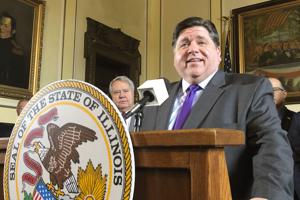On Jan. 29, Illinois Gov. J.B. Pritzker used his State of the State speech to declare: “The old patronage system needs to die…finally and completely.”
Here’s the Pritzker assault on patronage: Not one significant anti-corruption bill; Pritzker is in court trying to roll back critical ethics rules; he filled his administration with clouted hires.
Just one week after Pritzker’s State of the State speech, a federal court-appointed patronage watchdog reported his administration was blocking open communication with her office.
“We believe these new restrictions imposed by the Governor’s Office are unproductive to the previously cooperative efforts of the parties to eliminate unlawful patronage, reform state employment practices and implement lasting improvements,” court monitor Noelle Brennan wrote.
The governor’s spokesperson responded that the allegation Pritzker had reversed the cooperation of past governors was false: “There are no new restrictions, and the state will be responding in court shortly.”
More than five months passed. The only news about Pritzker and patronage came from a WBEZ report showing Pritzker hired 35 people from Illinois House Speaker Mike Madigan’s “clout list.” They collectively earn $2.5 million a year from board appointments and state jobs.
The report also found Democratic state Rep. Luis Arroyo and state Sen. Martin Sandoval got in on the action before being indicted on corruption charges. Pritzker gifted state transportation jobs to allies of both men, who were key to passing Pritzker’s year one agenda: a $45 billion infrastructure package funded by doubling the gas tax, a progressive income tax constitutional amendment, and the most expensive state budget in Illinois history.
On July 14, Pritzker’s court response finally came.
He said there was no patronage problem in Illinois’ executive branch of government. And he asked to scrap a federal anti-patronage consent decree in place since 1972.
Pritzker’s lawyers stated his office “instituted an independent and vigorous oversight structure” to prevent patronage.
Three days later, House Speaker Mike Madigan was implicated in a bribery scheme in which Commonwealth Edison executives said they hired and paid his cronies $1.3 million to curry Madigan’s favor on rates and regulations worth $150 million to the power utility. Madigan had extended government patronage to utility companies, even telling ComEd which meter readers to hire, the company’s prosecution agreement states. Federal investigators are making the same patronage inquiries about Madigan and AT&T.
Pritzker detests patronage. Pritzker blocks efforts to find patronage. Pritzker participates in patronage when Madigan tells him to. Pritzker wants to scrap 48 years of patronage safeguards in the executive branch because patronage is under control in his administration.
Patronage and Madigan? Well, that’s not Pritzker’s problem. He refused to call on the speaker to step down from the speakership or his post as chairman of the state Democratic party.
“It would be laughable if it weren’t so serious,” said state Rep. Grant Wehrli, R-Naperville. “Here we find ourselves in Illinois corruption and pay-to-play politics are in the news almost on a weekly basis, if not daily, and this is clearly a step in the wrong direction.”
Pritzker is having his “Mission Accomplished” moment. Patronage is far from dead in Illinois, and it will take more effort, not less, to kill the very deep roots of Illinois’ system of winning friends and influencing people by giving them public jobs at taxpayer expense.
Maybe instead of a $3.7 billion “fair tax” increase, some patronage hires should join Illinois’ long unemployment line?







